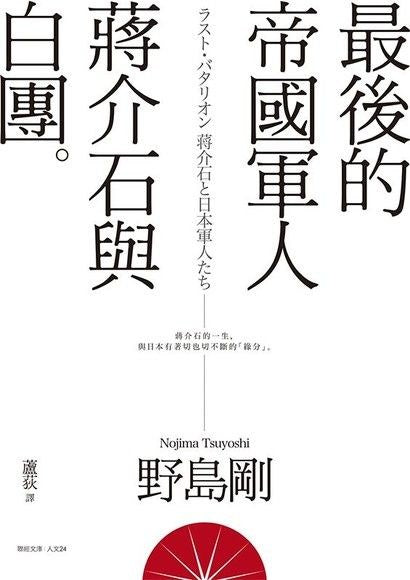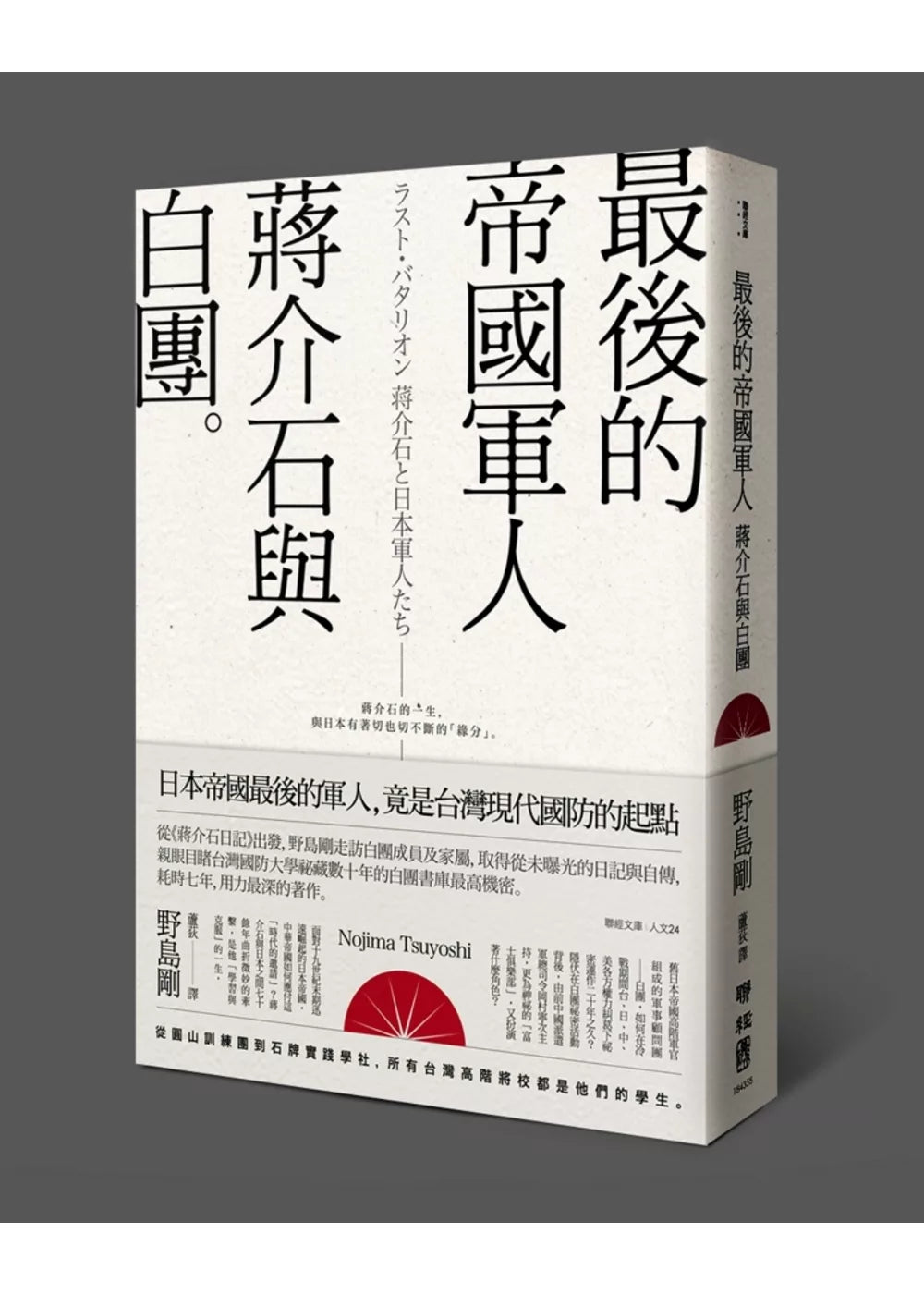1
/
of
2
The Last Imperial Soldier: Chiang Kai-shek and the White Guard
The Last Imperial Soldier: Chiang Kai-shek and the White Guard
Nojima Tsuyoshi Ludi 译
Regular price
$25.99 USD
Regular price
Sale price
$25.99 USD
Unit price
/
per
Low stock
Couldn't load pickup availability
About Book
About Book
ラスト・バタリオンChiang Kai-shek and Japanese soldier たち
The last soldiers of the Japanese Empire were the starting point of Taiwan's modern national defense?Following "The Separation of Two Forbidden Cities: The Fate of the Forbidden Cities on Both Sides of the Taiwan Strait Under the Twist of History" and "The Mysterious Along the River During the Qingming Festival",
The famous Japanese journalist Tsuyoshi Nojima started from "Chiang Kai-shek's Diary".
Interviews with members of the White Group and their families revealed a large number of diaries and autobiographies never before published.
Witnessing firsthand the top secret files in the White Group Library, which had been hidden for decades at the National Defense University of Taiwan.
It took seven years to write, revealing the mysterious relationship between Chiang Kai-shek and Japan, and the White Group!
Learning and Overcoming—Chiang Kai-shek's Life Reflects the Intertwined Context Between Modern China and Japan. Chiang Kai-shek's life can be described as one deeply connected to Japan. This wasn't limited to Chiang Kai-shek alone; rather, the Chinese people of that turbulent era, whether they wanted to or not, could not avoid the constant "invitation of the times" from their neighboring country.
No one can deny that modern Chinese history is closely tied to the fate of Chiang Kai-shek. Furthermore, the ups and downs of Chiang Kai-shek's life offer a particularly clear reflection of the relationship between Japan and China at the time. Therefore, studying Chiang Kai-shek's relationship with Japan is tantamount to exploring the relationship between China and Japan.
Learn from Japan, use Japan, and finally defeat Japan.
In this way, Chiang Kai-shek promoted the operation of a certain "historical will."
Among these, the thing that most particularly embodies the bridge of "learning and overcoming" between Chiang Kai-shek and Japan is the subject of "The Last Imperial Soldier: Chiang Kai-shek and the White Group" - the White Group.
Never-before-seen historical materials reveal the mystery of the White Corps. The White Corps' formation and realization occurred during that brief moment when Taiwan's fate shifted from darkness to light. The White Corps emerged and gradually grew as the United States abandoned Taiwan; soon after, the United States resumed its support for Taiwan. Chiang Kai-shek, at this time, was torn between conflicting emotions: despair and gratitude. On the one hand, he felt a deep sense of gratitude for the White Corps' heroic aid in his time of need. However, on the other hand, American military aid remained crucial to his defense of Taiwan and, ultimately, his counterattack on the mainland. This remained unchanged.
In this light, the White Group's twenty-year existence in Taiwan is the result of a confluence of fortuitous factors. With this in mind, it's perhaps not an exaggeration to consider the White Group a "freak" born like a miracle amidst the complexities of modern Asia.
Starting with the recently released "Chiang Kai-shek Diary", Nojima Tsuyoshi relentlessly explored a vast amount of data scattered across Taiwan, the United States, and Japan, including the never-before-seen "Cao Shicheng Archives", family letters and diaries of members of the White Corps, and other valuable historical materials. At the same time, through close interviews with relevant people, he faithfully portrayed the truest face of "politician Chiang Kai-shek" and the actual activities of the Japanese military advisory group "White Corps", presenting the more private and real human side of the White Corps beneath the outward image of "gratitude" and "anti-communism".
International media have praised Diamond Weekly: Translator, political and economic commentator Tokugawa Iehiro: The author, a journalist by training, excels at interviewing and penetrating human nature, presenting in detail the process by which defeated Japanese imperial soldiers rediscovered the value of life in Taiwan by assisting Chiang Kai-shek in his fight against the Communists.
Asahi Shimbun: Masayasu Hosaka, a famous writer and researcher of modern Japanese history, said: The author's concerns are both deep and broad. He not only reconstructed the secret military aid system between Taiwan and Japan after World War II, but also noticed the lack of war reflection among the soldiers of the old empire.
"Japan Economic Shimbun": Associate Professor Kawashima Makoto of the University of Tokyo: The book's merits outweigh its flaws. The author has unearthed historical materials that have been hidden for decades and no one has seen them. If you want to understand the Cold War landscape in East Asia after World War II, this book is a must-read.
Publication Date
Publication Date
2015-01-08
Publisher
Publisher
聯經出版公司
Imprint
Imprint
Pages
Pages
424
ISBN
ISBN
9789570845075
share



